Twins share journey from
California Cadet Corps to Stanford University
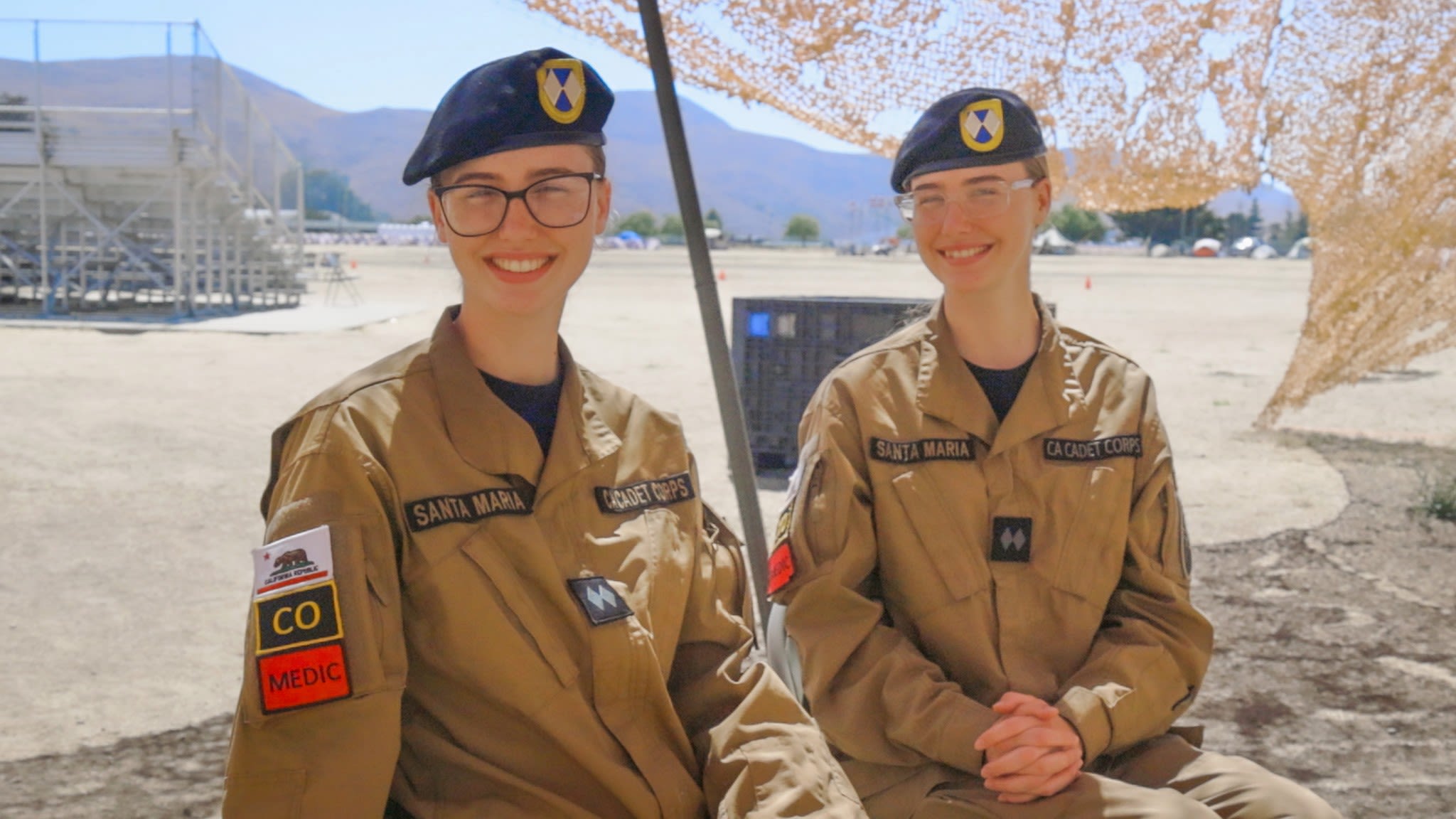
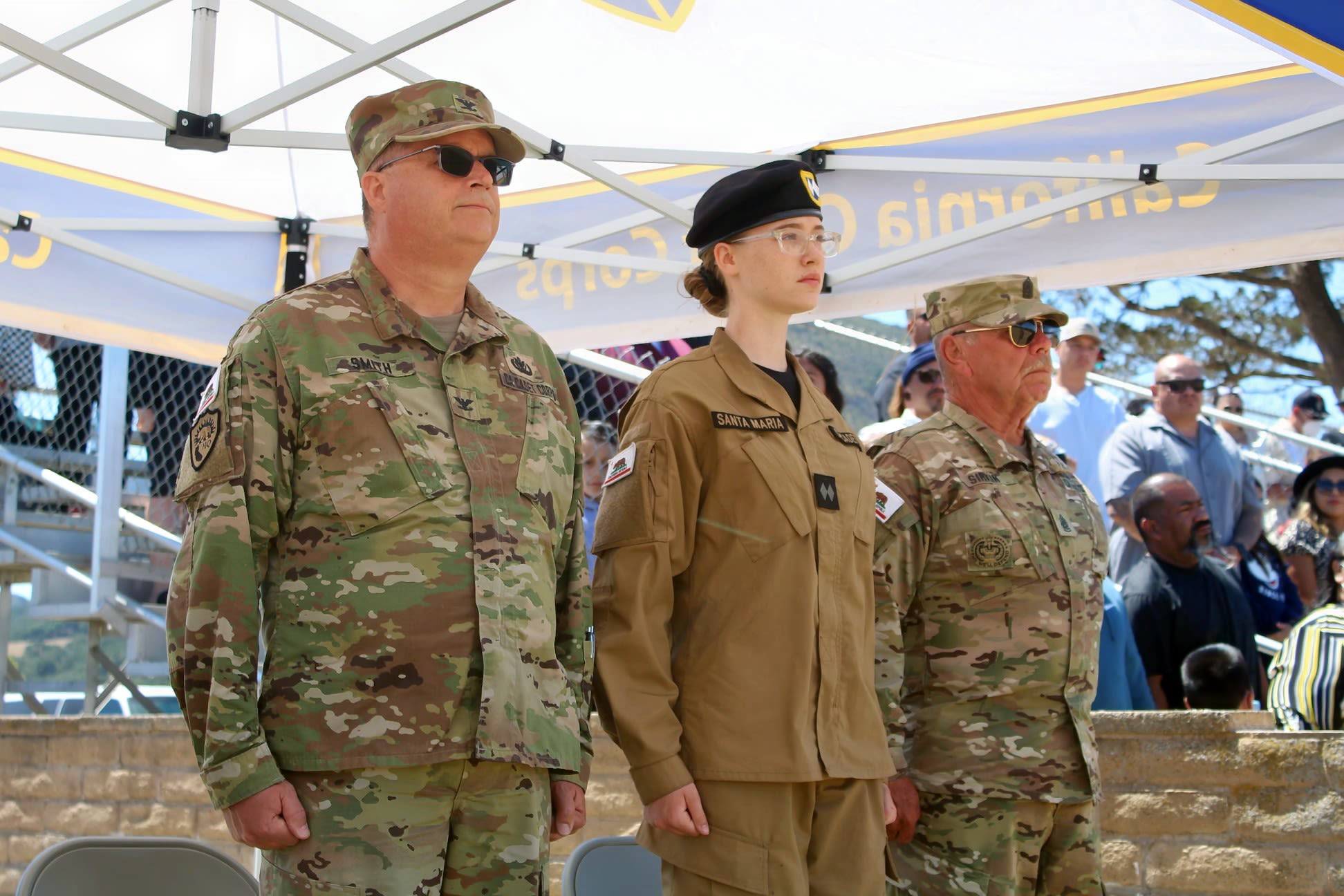
Cadet Col. Katelyn Santa Maria (center) stands next to CACC Col. Michael Smith (left) and CACC Command Sgt. Maj. Dennis Sirkin (right) during CACC summer encampment, in which Santa Maria served as commanding officer. She is currently attending Stanford University, majoring in Human Biology.
Cadet Col. Katelyn Santa Maria (center) stands next to CACC Col. Michael Smith (left) and CACC Command Sgt. Maj. Dennis Sirkin (right) during CACC summer encampment, in which Santa Maria served as commanding officer. She is currently attending Stanford University, majoring in Human Biology.
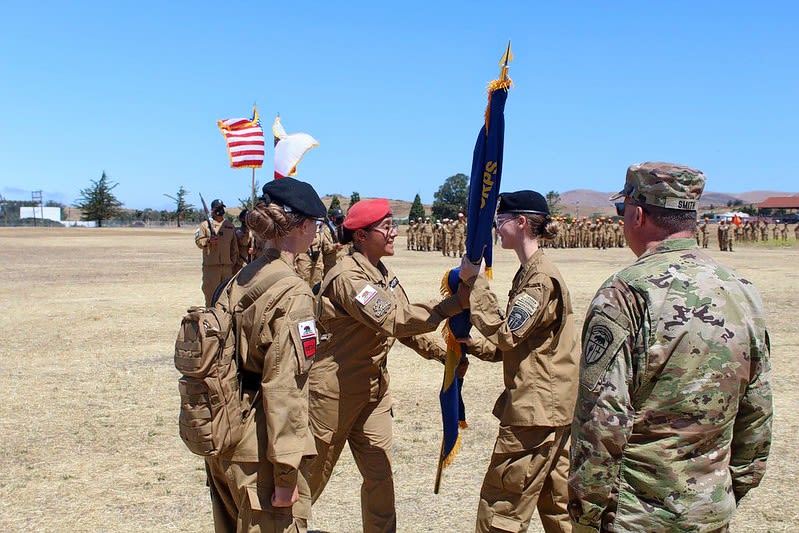
Katelyn Santa Maria (right) receives the California Cadet Corps flag during a change of command ceremony. Katelyn, from Los Angeles, participated in the CACC program with her identical twin sister, Lorelei (far left).
Katelyn Santa Maria receives the California Cadet Corps flag during a change of command ceremony. Katelyn, from Los Angeles, participated in the CACC program with her identical twin sister, Lorelei (far left).
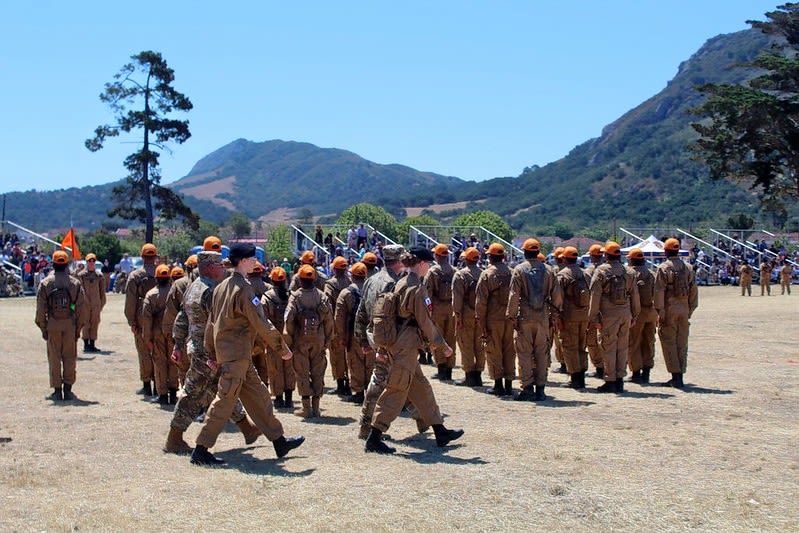
Cadets Lorelei Santa Maria (left) and Katelyn Santa Maria (right) march alongside CACC Col. Michael Smith and CACC Command Sgt. Maj. Dennis Sirkin for Pass in Review during California Cadet Corps summer camp.
Cadets Lorelei Santa Maria (left) and Katelyn Santa Maria (right) march alongside CACC Col. Michael Smith and CACC Command Sgt. Maj. Dennis Sirkin for Pass in Review during California Cadet Corps summer camp.
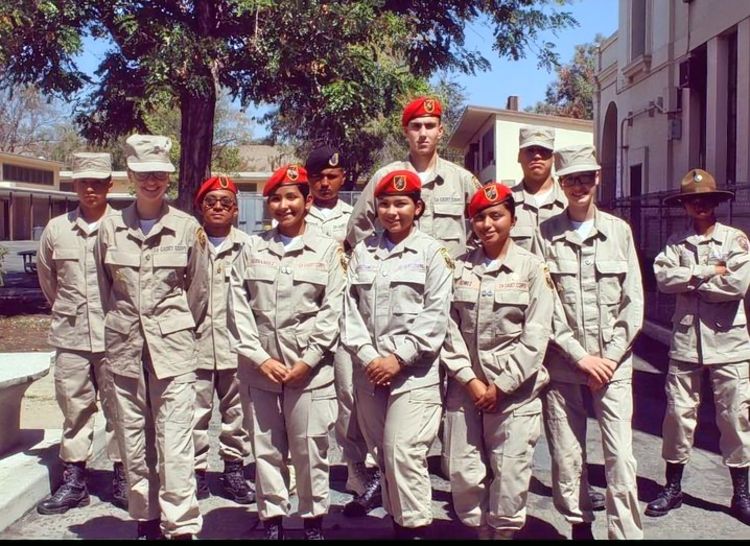
Lorelei Santa Maria (left) and Katelyn Santa Maria (right) pose with members of 8th Brigade. The identical twin sisters earned the highest rank - Cadet Colonel - in the California Cadet Corps.
Lorelei Santa Maria (left) and Katelyn Santa Maria (right) pose with members of 8th Brigade. The identical twin sisters earned the highest rank - Cadet Colonel - in the California Cadet Corps.
Story by guest contributor 1st Lt. Jennifer Brofer
California Cadet Corps
Feb. 21, 2024
Sacramento, Calif.–When identical twin sisters, Lorelei and Katelyn Santa Maria, now students at Stanford University, graduated from high school in 2021, they had achieved the highest rank possible – Cadet Colonel – while enrolled in the California Cadet Corps (CACC), a youth program for middle and high schools that falls under the banner of Task Force Torch, the California Military Department's Youth and Community Programs Task Force.
Though the Santa Maria sisters were constantly compared to each other by their peers, they encouraged each other along the way, rather than compete.
“I am a naturally competitive person, but I've never really felt competitive with Katelyn,” said Lorelei, who was born exactly two minutes ahead of her sister. “Of course, we have been compared in appearance, personality, academics, etc., our whole lives, but Katelyn has always helped to lift me up whenever she is stronger in something, and vice versa," she explained. "We are definitely more of a team than anything else, and we wouldn't want it any other way."
“[We] definitely felt competitive, but in the most uplifting way,” echoed Katelyn. “We both want to strive for the top positions and more responsibility, but ultimately I think that pushes each other to succeed.”
The Santa Maria sisters said they stumbled upon the CACC program by accident, but quickly found value in what the leadership laboratory provides to its Cadets.
“We had just moved to a new school, and the only mandatory elective that was available was the CACC,” said Lorelei. “But when we saw the class for the first time, we absolutely loved it. The discipline and leadership potential really drew us in.”
Katelyn added, “I started to see how valuable the program was, not only for personal development but the development of others and teams, growing to see past the military uniforms and structure and into the meaning behind every task and activity," she said, explaining CACC's teachings extend beyond the program and gave them the skills necessary for higher education.
Despite the military structure of the program, the twins explained it’s not a feeder program into military service and only a small percentage of graduates go on to join the military.
“Yes, we wear uniforms, we drill, and we shout loud and proud, however, to see this as all that the Cadet Corps does would be doing it a gross disservice,” Katelyn said. “The Cadets in the Corps graduate with a sense of confidence, greater public speaking skills, leadership capability, and innumerable marketable ‘hard’ and ‘soft’ skills," she explained.
The Cadets hone skills like Microsoft Office, accountability, interpersonal communication, conflict resolution, responsibility, time management, counseling, logistical planning, and media navigation, all highly valuable skills outside of military purposes.
Reflecting on their Cadet Corps experience, the sisters shared how the program promotes skills and experiences that are directly transferable to higher education and the workforce.
“One of the most transferable aspects of the Cadet Corps is the grit and endurance it teaches you,” said Katelyn. “It’s instilled in everything that Cadets do – drill, sounding off, mountaineering, and in-class instruction. Almost everything that the Cadet Corps asks you to do requires that you step out of your comfort zone and prime yourself for improvement," she said. "Aside from the mere encouragement of perseverance within the program, the Corps teaches you public speaking, time management, and how to think on your feet. It also instills in every Cadet the need to succeed academically to be a good leader and a good example for your peers and subordinates.”
Lorelei added, “The California Cadet Corps empowers strong leaders all around."
She explained that by promoting an environment of fairness and pushing Cadets to earn their ranks, both males and females can earn roles equally within the program. "The CACC empowers its young women and men by ensuring this equity by design," Lorelei said.
At Stanford, Lorelei is majoring in Human Biology with a focus in Brain and Behavior studies. She aims to finish her undergraduate career in three years, with the goal to earn a Master's Degree in Community Health Prevention Research. After graduation, she plans to attend medical school with the ultimate goal of becoming a pediatric physician and going on to serve in the Army Medical Corps before eventually opening her own practice.
While Lorelei keeps herself busy with her studies, she still remembers one particular CACC officer, retired U.S. Army Col. Grace Edinboro, as the person she looked up to the most.
“Not only was she thoughtful with every idea she had, but she genuinely welcomed ideas and was eager to make improvements in any way she could to best support the Cadets,” Lorelei shared. “She influenced how I held myself as an officer in the CACC, and how I view team dynamics and respect as a whole.”
Katelyn is majoring in Human Biology at Stanford, focusing on Comparative Anatomy and Animal Science, with the goal of one day becoming a veterinarian, “specifically for wildlife or aquatics, in the Army Veterinary Corps, or for the Marine Mammal Program in the Navy or elsewhere," she said.
Katelyn credits some of her success to CACC Lt. Col. Kevin Baxter, a CACC leader whom she refers to as her “Cadet Corps dad,” for providing strong mentorship and lessons she’s carried with her to this day.
“Lt. Col. Baxter was one person who encouraged me to continue to strive for top positions and ranks even when I doubted myself,” said Katelyn. “Even after I’ve graduated from the Corps as a cadet, he continues to be a mentor for me and someone I can share exciting news with, ask for recommendations, and continuously count on.”
As the Santa Maria sisters continue their journey of academic excellence, they bring with them the confidence that they can achieve whatever goals they set their minds to.
“There is a grit that comes with facing any challenge that the CACC helped to reinstate young,” said Lorelei. “Life can knock you in the teeth sometimes, even when you don't do a single thing wrong, but you need to have the strength to get up, shake it off, and get at it again with more strength and strategy. The CACC helped to teach us that for sure!”

